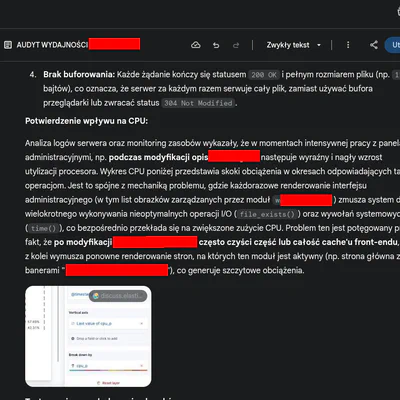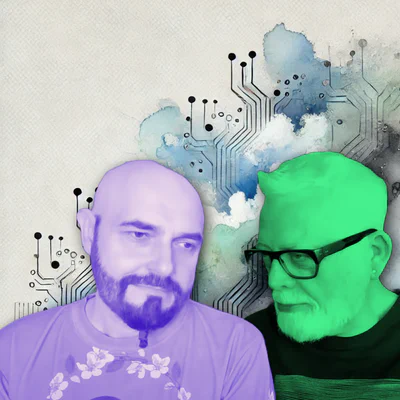SEO spam has evolved from primitive link farming techniques to methods using LLM. Analysis of AI's impact on content marketing and SEO. Why mass content generation by artificial intelligence can lead to positioning problems and how assisted search will change the rules of the game in the future.
Table of Contents
SEO Spam has evolved. From primitive link farming techniques, it has progressed to sophisticated methods using LLM in mass disinformation campaigns and algorithm manipulation. Before I delve into the technical details of these practices in my next article, let’s take a closer look at an industry that balances on the edge between marketing and spam. Today, I know this black hat SEO industry mainly from server hack repairs, reputation cleanups, and fixes after SEO magicians… However, I know the working methods, reasons for use, and mechanisms of these solutions very well.
The Deceptive Revolution in Content Marketing
Today, every business owner or person ordering website content thinks they’ve struck gold, because they can generate an infinite number of texts on any topic in seconds, texts that appear stylistically correct and well-written. There’s no denying that LLM models, commonly known as AI, can generate statistically beautiful and unique texts, which was a challenge in content marketing.
ChatGPT Replaces Humans - What Savings!
It was hard to find a good Copywriter who knew market nuances and could write texts following SEO and marketing guidelines. The question is, can ChatGPT replace such a copywriter? And what about the long-term costs associated with algorithm changes? Let’s look at what such text looks like.
Typical AI Content Generation Process
Creating good text seems simple on the surface. Typically, people paste offers from their own or competitors’ sites, create context with a description of what they want to achieve, and then generate successive texts through repeated refinements. Even someone with average expertise can do this.
Characteristic AI Text Patterns
The problem is that these texts have an AI pattern that’s not just easy to detect, but is devoid of character and personality. Here are the most common patterns indicating AI-generated text:
1. Linguistic Structure:
- Excessively ordered paragraph structure
- Recurring transition phrases (“moreover”, “it should be noted”, “it’s worth emphasizing”)
- Too formal expressions in informal contexts
- Predictable sentence constructions
- Certain punctuation and typographical elements
2. Style and Tone:
- Excessive emotional neutrality
- Lack of personal experiences and anecdotes
- Too perfect transitions between paragraphs
- Rigid adherence to one formality level (apparent style modification is superficial)
3. Content:
- Superficial coverage of many aspects without deeper analysis
- Generic examples without specific details
- Lack of controversial opinions
- Excessive use of statistical facts
Scientific Confirmation of the Problem
A recent study “Is Google Getting Worse? A Longitudinal Investigation of SEO Spam in Search Engines” conducted by researchers from German universities (Leipzig University, Bauhaus-Universität Weimar, and ScaDS.AI) provides hard evidence for the problem I’m describing. The year-long empirical analysis shows clear patterns in search results:
1. Artificial Content Pattern:
- Decreasing content originality ratio (Review-Non-review Ratio, R² = .97) - the higher the position in search results, the fewer original reviews/opinions and more standard, generic text. The strong correlation (0.97) shows this is not coincidental.
- Decline in language complexity (Function Word Ratio, R² = .97) - the decrease in function words usage (prepositions, conjunctions, etc.) indicates language simplification; the text becomes more “mechanical”.
- Decreasing text difficulty level (Flesch Grade, R² = .96) - standard text readability test; declining score indicates that texts in higher positions are simpler and more basic.
2. SEO Manipulation Patterns:
- Increasing header-keyword matching (Heading-Keyword Overlap, R² = .96) - the higher the position, the more keywords in headings - a classic SEO technique.
- Decreasing main content word count - Less words in main content but more repetitions - indicates optimization for specific phrases instead of creating valuable content.
- Increased repetition of the same phrases and words - Pattern of repeating the same words and phrases - typical SEO over-optimization.
3. Spam Effectiveness:
- High number of affiliate links in top positions - Pages with more affiliate links rank higher in results.
- Consistent optimization patterns (most R² coefficients above 0.90) - High R² (>0.90) indicates that these patterns are very consistent and non-random.
- Clear correlation between position and content “optimization” level - The more “optimized” (i.e., artificial) the page is, the higher its position.

This study confirms that the problem I’m describing isn’t just theoretical - we have empirical evidence of how effectively SEO spam infiltrates search results. Moreover, the detected patterns exactly match the characteristics I listed as typical for AI-generated content. We can therefore expect that mass use of AI for content generation will only deepen this problem. Contrary to appearances, this opens the way for ethical and long-term strategies…
The Future of Search and Content Marketing
So here’s a message for everyone who thinks they’ve struck gold and optimized costs. The AI-assisted search model is already slowly rolling out, and your pages will be analyzed by LLM and won’t stand out from your competition, which generated equally lifeless, perfectly fairytale-like texts. What will you do then, what prompt will you give, and how will you modify your own pages that have been consistently lowering their reputation through SEO spam?
Alternatives to AI Generated Content - There’s a Better Way
So what to do and how to live, as the classic saying goes… Well, there are effective alternatives to mass AI content generation. The first is the hybrid model, where AI serves as an assistant for research and initial drafts, but humans provide the main narrative and tone. The second option is content curation plus - collecting and analyzing existing industry content while adding unique, expert perspective. You can also focus on documenting real experiences, describing actual company cases and sharing decision-making processes. Another interesting approach is creating less but more in-depth content (depth-first content), focusing on quality and regular content updates. Of course, there’s no rose without thorns - if you don’t want to put in the work, there won’t be results, because these alternatives require more effort than mass AI generation, but they deliver better long-term results and - most importantly - build real value for readers, not just fill space on the page. It’s also worth considering using moderated user-generated content, where community-created content is professionally edited and enriched with expert commentary - though this element is becoming increasingly controversial for a simple reason: people are massively using AI to generate texts and creativity no longer gives them pleasure.
The Coming Deprecation of AI-Generated Content
I propose that soon, to distinguish this spam from valuable content, algorithms will be modified to depreciate the value of such sites. Then a problem will arise. What magic trick will you need to pull to appear in the coveted search result, which will be further semantically manipulated by paid ads and the pay2win model?
This is a rhetorical question I leave with all the marketing “experts” and fortune-tellers who claim to know what the true algorithm models will be in six months. For me, current spamming with ChatGPT-generated content is on par with black hat SEO methods.
Source
Is Google Getting Worse? A Longitudinal Investigation of SEO Spam in Search Engines





